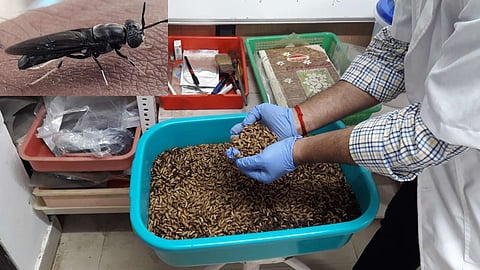

The Kochi-based Central Marine Fisheries Research Institute (CMFRI) has developed a new type of eco-friendly fish food using black soldier fly larvae.
The new insect-protein-based fish feed is expected to help reduce the need for traditional fishmeal, often linked to overfishing and fluctuating prices.
CMFRI has transferred the new technology to Amala Ecoclean, a company that focuses on sustainable waste management, for large-scale commercial production.
The CMFRI director Dr Grinson George said that this new technology will help address two important environmental problems: waste reduction and sustainable protein for aquaculture.
This aligns with global efforts to make aquaculture more eco-friendly.
“This aligns with global efforts to make aquaculture eco-friendly and reduce the environmental footprint of fish farming,” he said.
The nutrient-rich larvae can eat a variety of organic waste, making them a sustainable protein source.
The larvae are processed into a meal that can be easily added to fish food. It has proven to help fish grow faster and healthier, and it can also save money for fish farmers.
Initial tests conducted by CMFRI showed that the larvae-based feed is as good as traditional feeds, without affecting the performance or growth of aquaculture species.
As part of the commercialization process, ICAR-CMFRI and Amala Ecoclean will continue to work together to improve the feed for various fish species and farming conditions.
CMFRI was in the news recently when it decoded the genome sequence of Asian green mussel, or kallummakkaya in local parlance, which will act as a vital tool in cancer research.
They have also launched GreenRexTM, a seaweed-based product called nutraceuticals, used both for nutrition and medicine.